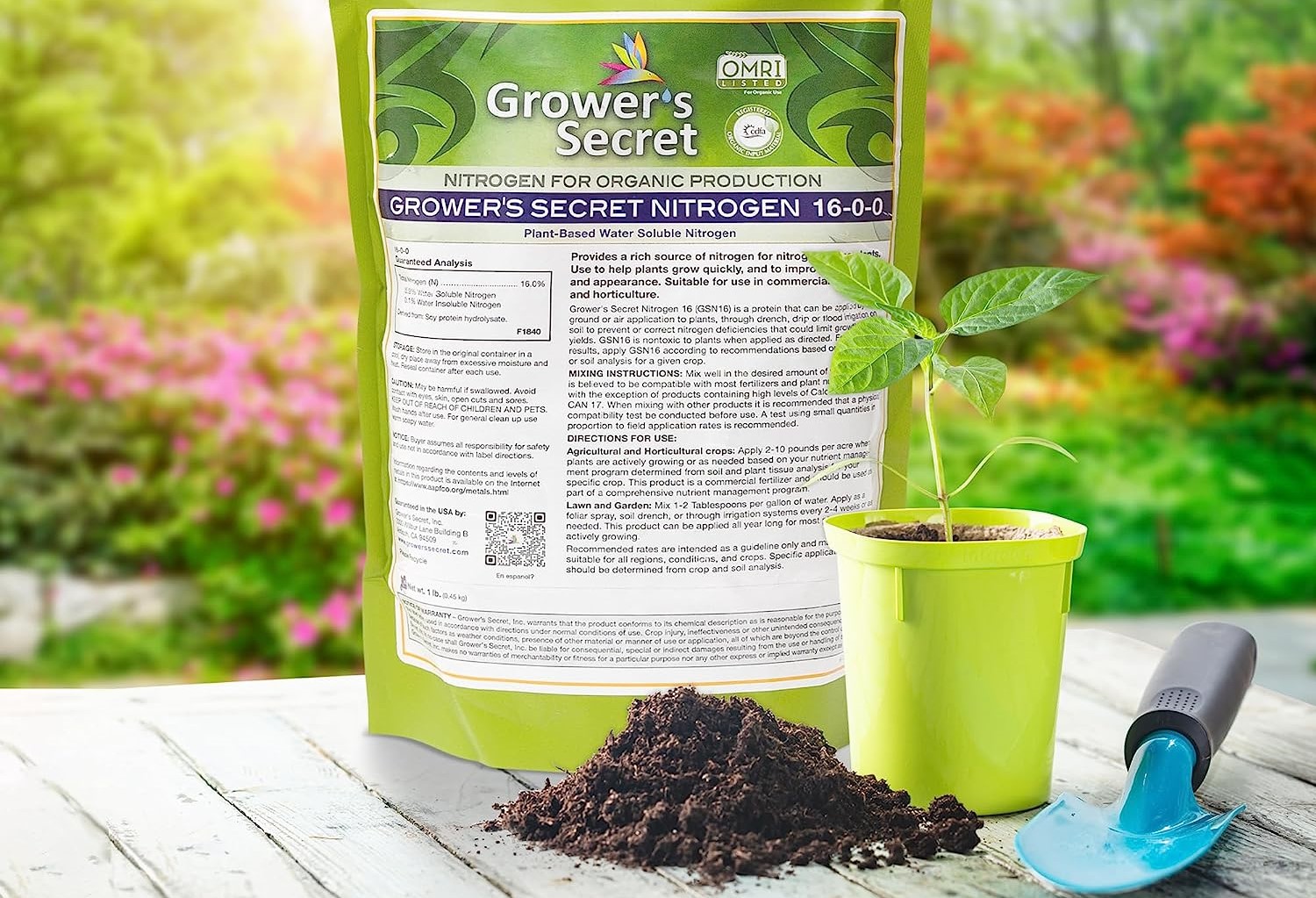Home>Gardening Tips and Tricks>What Is A Synthetic Fertilizer


Gardening Tips and Tricks
What Is A Synthetic Fertilizer
Modified: January 22, 2024
Discover the benefits of synthetic fertilizers for maximizing your yield. Boost the growth and productivity of your crops with these powerful nutrients.
(Many of the links in this article redirect to a specific reviewed product. Your purchase of these products through affiliate links helps to generate commission for Chicagolandgardening.com, at no extra cost. Learn more)
Table of Contents
Introduction
Welcome to the world of fertilizers, where the quest for maximizing yield and promoting plant growth is a top priority. With the ever-expanding demands of agriculture, farmers and gardeners alike are constantly seeking effective ways to enhance crop production. One solution that has gained significant popularity is the use of synthetic fertilizers.
Synthetic fertilizers, also known as chemical fertilizers, are industrially produced substances that provide plants with essential nutrients. They are designed to supplement or replace the natural nutrients found in soil, ensuring optimal growth and increasing crop yields. With their convenient availability and ability to rapidly boost plant growth, synthetic fertilizers have become a valuable tool in modern agriculture.
These fertilizers are formulated with a precise balance of key nutrients, such as nitrogen, phosphorus, and potassium, commonly referred to as NPK. Each nutrient plays a crucial role in supporting different aspects of plant development. Nitrogen promotes leaf and stem growth, phosphorus aids in root development and flower and fruit production, while potassium improves overall plant health and disease resistance.
One of the key advantages of synthetic fertilizers is their ability to provide plants with concentrated and readily available nutrients. Unlike organic fertilizers that require time to break down and release nutrients into the soil, synthetic fertilizers can deliver an immediate nutrient boost to plants. This fast-acting nature allows farmers and gardeners to address specific nutrient deficiencies and maximize the potential of their crops.
Furthermore, synthetic fertilizers are highly customizable, offering the flexibility to meet the specific nutritional needs of different plants. Farmers can select fertilizers with different NPK ratios, tailoring the nutrient composition to suit their crops. This precision ensures that plants receive the exact balance of nutrients required for optimal growth and development.
While synthetic fertilizers provide numerous benefits, it is important to consider their potential negative impacts as well. As we delve deeper into the world of synthetic fertilizers, we will explore the different types, benefits, drawbacks, and alternative options available. By understanding the full spectrum of fertilizers, we can make informed choices that balance maximizing yield with sustainable and eco-friendly practices.
Definition of Synthetic Fertilizer
Synthetic fertilizers are manufactured fertilizers that are formulated in laboratories or production facilities. They are composed of chemically synthesized nutrients that mimic the natural nutrients found in soil. These nutrients are typically derived from non-renewable sources, such as fossil fuels, and undergo various chemical processes to create fertilizers with specific nutrient compositions.
The primary components of synthetic fertilizers are nitrogen (N), phosphorus (P), and potassium (K), which are essential macronutrients for plant growth. These nutrients are present in synthetic fertilizers in the form of synthetic compounds, such as ammonium nitrate, urea, diammonium phosphate, and potassium chloride, among others. These compounds are carefully selected and blended to provide the optimal nutrient ratios for different types of plants and crops.
Unlike organic fertilizers, which are derived from natural sources such as compost, manure, or plant material, synthetic fertilizers offer a more precise and consistent nutrient composition. This allows farmers and gardeners to have better control over the nutrient levels in the soil, ensuring that plants receive the necessary nutrients for optimal growth.
Another defining characteristic of synthetic fertilizers is their solubility. These fertilizers are usually water-soluble, meaning that they dissolve easily in water and can be absorbed quickly by plant roots. This feature allows for rapid nutrient uptake, allowing plants to access the necessary nutrients almost immediately.
It is important to note that synthetic fertilizers are labeled with three numbers on their packaging, representing the NPK ratio. For example, a fertilizer labeled as 10-10-10 indicates a balanced ratio of nitrogen, phosphorus, and potassium, where each nutrient constitutes 10% of the overall composition. This labeling system helps users determine the nutrient content of the fertilizer and choose the appropriate formulation for their plants.
Overall, synthetic fertilizers offer a convenient and effective solution for supplementing nutrient deficiencies in soil and promoting plant growth. However, it is crucial to use synthetic fertilizers responsibly and in moderation to prevent negative impacts on the environment and maintain the long-term health of the soil.
Types of Synthetic Fertilizers
Synthetic fertilizers come in various forms and formulations, each designed to meet specific plant nutritional needs. Here are some of the common types of synthetic fertilizers:
- Nitrogen-based fertilizers: These fertilizers contain a high concentration of nitrogen, which is essential for promoting lush, green foliage growth. They are commonly represented by numbers such as 10-0-0 or 20-10-10, indicating the percentage of nitrogen in the formulation.
- Phosphorus-based fertilizers: Fertilizers with a higher phosphorus content are ideal for promoting root development, flowering, and fruiting in plants. They are labeled with numbers such as 0-10-0 or 10-20-10, denoting the phosphorus percentage in the product.
- Potassium-based fertilizers: These fertilizers are rich in potassium, which aids in overall plant vigor, disease resistance, and stress tolerance. They are often marked with numbers like 0-0-10 or 10-10-20, indicating the potassium level within the formulation.
- Compound fertilizers: Compound fertilizers combine two or more nutrients in a single formulation. For example, a balanced fertilizer labeled as 10-10-10 contains equal amounts of nitrogen, phosphorus, and potassium. Compound fertilizers offer a convenient option for providing a balanced nutrient supply to plants.
- Specialty fertilizers: These fertilizers are tailored to meet specific plant requirements or address certain deficiencies. Examples include slow-release fertilizers that deliver nutrients gradually over time, micronutrient fertilizers that provide essential trace elements, and acidifying or alkalizing fertilizers that adjust soil pH.
It is important to choose the right type of synthetic fertilizer for your specific plants and soil conditions. Understanding the nutritional needs of your plants and conducting soil tests can help identify any deficiencies and guide you in selecting the appropriate fertilizer.
Regular soil testing can also determine the existing nutrient levels in the soil and guide the application of synthetic fertilizers to supplement any deficiencies. Avoid over-application of fertilizers, as excessive nutrient levels can lead to imbalances, nutrient runoff, and environmental pollution.
By selecting the right type of synthetic fertilizer and using it judiciously, you can effectively nourish your plants and promote healthy growth while minimizing any potential negative impacts on the environment.
Benefits of Synthetic Fertilizers
Synthetic fertilizers offer several benefits that make them a popular choice among farmers and gardeners. Here are some of the advantages:
- Enhanced crop yields: Synthetic fertilizers provide plants with a concentrated and readily available source of nutrients, ensuring optimal growth and higher crop yields. By addressing nutrient deficiencies in the soil, synthetic fertilizers help plants reach their full potential and produce abundant harvests.
- Fast-acting results: Unlike organic fertilizers that require time to break down and release nutrients, synthetic fertilizers offer immediate results. Their water-soluble nature allows for quick absorption by plant roots, leading to faster growth and development.
- Customizable nutrient composition: Synthetic fertilizers can be tailored to meet the specific nutritional needs of different plants. With different formulations and ratios of nitrogen, phosphorus, and potassium, farmers and gardeners have the flexibility to provide the ideal nutrient balance for various crops.
- Precision in nutrient delivery: Synthetic fertilizers provide a precise and consistent nutrient composition, ensuring that plants receive the required nutrients in the right quantities. This precision allows for efficient nutrient management and minimizes the risk of nutrient imbalances.
- Convenient availability: Synthetic fertilizers are widely available and easily accessible for farmers and gardeners. They can be purchased in various forms, such as granules, powders, or liquids, making them convenient to use and apply in different agricultural settings.
- Increased plant resistance: Nutrient-rich plants are better equipped to withstand diseases, pests, and environmental stresses. Synthetic fertilizers help promote healthier, more robust plants, enhancing their resistance to various threats and ensuring better crop quality.
By harnessing the benefits of synthetic fertilizers, farmers can efficiently maximize their crop yields and meet the increasing demand for food production. However, it is important to use synthetic fertilizers responsibly and exercise caution to minimize potential negative impacts on the environment and soil health.
Negative Effects of Synthetic Fertilizers
While synthetic fertilizers offer numerous benefits, it is essential to recognize and understand the potential negative effects associated with their use. Here are some of the drawbacks:
- Environmental pollution: One of the primary concerns is the potential for nutrient runoff into water bodies. When synthetic fertilizers are over-applied or applied before heavy rainfall, excess nutrients can enter rivers, lakes, and oceans, leading to water pollution and harmful algal blooms.
- Soil degradation: Continuous reliance on synthetic fertilizers without proper management can contribute to soil degradation. These fertilizers can alter the soil’s pH, decrease organic matter content, and disrupt the natural microbial and nutrient cycling processes, leading to reduced soil fertility over time.
- Imbalanced nutrient levels: Incorrect application of synthetic fertilizers can result in imbalanced nutrient levels in the soil. Excessive use of certain nutrients, such as nitrogen, can lead to nutrient imbalances, negatively impacting plant health, water quality, and overall ecosystem balance.
- Reduced biodiversity: Intensive use of synthetic fertilizers can have adverse effects on beneficial soil organisms and native plant species. It can disrupt the natural balance of the ecosystem and reduce biodiversity, impacting the overall health and resilience of the ecosystem.
- Economic costs: The cost of synthetic fertilizers can be a significant expense for farmers, especially when large quantities are required. Over-dependence on synthetic fertilizers can also lead to reduced self-sufficiency in nutrient management and increased reliance on external inputs.
- Health risks: Improper handling and application of synthetic fertilizers can pose health risks to farmers, workers, and nearby communities. Exposure to concentrated fertilizers or inhalation of their dust particles can lead to respiratory issues, skin irritation, and other health problems.
It is important to address and mitigate these negative effects by adopting responsible fertilizer usage practices. This includes applying fertilizers in accordance with soil test results, following recommended application rates, timing applications appropriately, and implementing soil conservation measures.
By carefully managing the use of synthetic fertilizers and exploring sustainable alternatives, we can minimize their environmental impact and preserve soil health for future generations.
Environmental Impacts of Synthetic Fertilizers
The use of synthetic fertilizers can have significant environmental impacts. While they can enhance crop growth and maximize yields, it is essential to consider and address their effects on the environment. Here are some of the key environmental impacts associated with synthetic fertilizers:
- Water pollution: Excessive use or improper application of synthetic fertilizers can lead to nutrient runoff into water bodies. The excess nitrogen and phosphorus in the runoff can cause eutrophication, leading to the growth of harmful algae and depleting oxygen levels in aquatic ecosystems, negatively impacting fish and other aquatic organisms.
- Algal blooms: Elevated nutrient levels from synthetic fertilizers can contribute to the formation of harmful algal blooms. These blooms can release toxins into the water, leading to health risks for humans, wildlife, and marine organisms. Additionally, the decomposition of algae can deplete oxygen levels in water, creating dead zones where aquatic life cannot survive.
- Soil degradation: Continuous use of synthetic fertilizers without proper management practices can result in soil degradation. The overuse of certain nutrients, such as nitrogen, can lead to imbalances in soil fertility, nutrient leaching, and soil acidification. This can negatively impact the physical structure, nutrient-holding capacity, and overall health of the soil.
- Loss of biodiversity: Synthetic fertilizers can have adverse effects on soil organisms, including beneficial microbes and insects, leading to a decline in soil biodiversity. This loss of biodiversity can disrupt nutrient cycling processes, impairing the natural ecosystem balance and resilience.
- Greenhouse gas emissions: The production, transportation, and application of synthetic fertilizers can contribute to greenhouse gas emissions. The manufacturing process emits carbon dioxide and other greenhouse gases, while the use of nitrogen-based fertilizers can result in the release of nitrous oxide, a potent greenhouse gas that contributes to climate change.
- Reduced nutrient efficiency: Synthetic fertilizers can contribute to inefficient nutrient use in crops. When applied in excess or without considering the specific nutrient needs of plants, a significant portion of the nutrients can be lost through runoff or leaching, resulting in wasted resources and increased environmental impacts.
To mitigate the environmental impacts of synthetic fertilizers, it is important to adopt sustainable fertilizer management practices. This includes using fertilizers judiciously, following recommended application rates, implementing proper timing and methods of application, utilizing precision agriculture techniques, and incorporating organic materials and biological soil amendments to enhance soil health and nutrient cycling.
By taking proactive measures to reduce the environmental footprint of synthetic fertilizers, we can protect water quality, preserve soil health, and maintain the overall sustainability of agricultural systems.
Alternatives to Synthetic Fertilizers
As concerns about the environmental impact of synthetic fertilizers continue to grow, many farmers and gardeners are exploring alternative methods to nourish their plants and improve soil health. Here are some effective alternatives to synthetic fertilizers:
- Organic fertilizers: Organic fertilizers, such as compost, manure, and bone meal, provide a natural and sustainable source of nutrients for plants. These fertilizers are derived from organic matter and release nutrients slowly as they break down, enriching the soil and promoting long-term soil health.
- Cover cropping: Planting cover crops like legumes or grasses can help improve soil fertility naturally. These crops reduce soil erosion, fix nitrogen from the atmosphere, and add organic matter when incorporated into the soil, enhancing nutrient cycling and soil structure.
- Crop rotation: Rotating crops strategically can help break pest and disease cycles, improve soil fertility, and reduce the need for synthetic fertilizers. Different crops have varying nutrient requirements, so rotating crops can help balance soil nutrient levels naturally.
- Composted green manure: Composting green manure, such as clover or alfalfa, and using it as a soil amendment enriches the soil with organic matter and nutrients. This practice enhances soil structure, improves water-holding capacity, and promotes beneficial microbial activity.
- Biological amendments: Using biological amendments, such as beneficial bacteria, mycorrhizal fungi, and biofertilizers, can enhance nutrient uptake and improve plant growth naturally. These amendments establish symbiotic relationships with plant roots, aiding in nutrient availability and overall plant health.
- Integrated nutrient management: Integrating multiple approaches like organic fertilizers, cover cropping, crop rotation, and precision nutrient management can optimize nutrient availability, reduce reliance on synthetic fertilizers, and promote sustainable agricultural practices.
It is important to note that transitioning to alternative fertilization methods may require adjustments and patience. Organic fertilizers and natural soil amendments may release nutrients more slowly, which necessitates proper nutrient planning and management. Soil testing and monitoring are important to ensure plants receive adequate nutrition throughout their growth cycles.
By implementing these alternative practices, farmers and gardeners can reduce reliance on synthetic fertilizers, promote soil health, enhance biodiversity, and contribute to more sustainable and environmentally friendly agricultural systems.
Conclusion
Synthetic fertilizers play a vital role in modern agriculture, offering a convenient and effective way to maximize crop yields and promote plant growth. Their ability to provide readily available nutrients and customizable formulations has revolutionized the industry, enabling farmers to meet the ever-increasing demands for food production.
However, it is important to recognize the potential negative effects of synthetic fertilizers on the environment and soil health. Excessive use, nutrient runoff, and soil degradation can lead to water pollution, biodiversity loss, and reduced long-term fertility. As such, it is crucial to adopt responsible fertilizer management practices and explore sustainable alternatives.
Organic fertilizers, cover cropping, crop rotation, and integrated nutrient management offer promising alternatives that promote soil health, reduce environmental impacts, and support long-term sustainability. By combining these approaches and incorporating organic practices, farmers and gardeners can nourish their plants, enhance soil fertility, and protect natural ecosystems.
It is important to strike a balance between maximizing yield and practicing ecologically sound farming methods. Responsible fertilizer usage, precision nutrient management, and regular soil testing can help ensure that plants receive the necessary nutrients without causing harm to the environment.
In conclusion, synthetic fertilizers have revolutionized agriculture and allowed for increased food production. However, to achieve a more sustainable future, it is crucial to adopt alternative methods, reduce reliance on synthetic fertilizers, and embrace practices that maintain soil health, enhance biodiversity, and safeguard our natural resources for generations to come.










